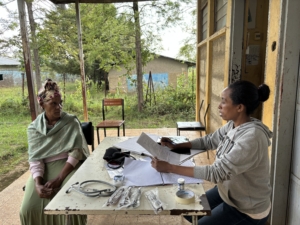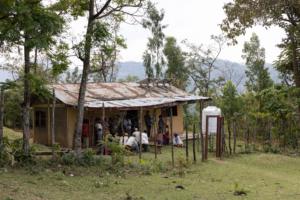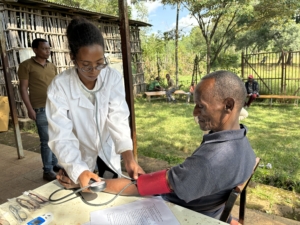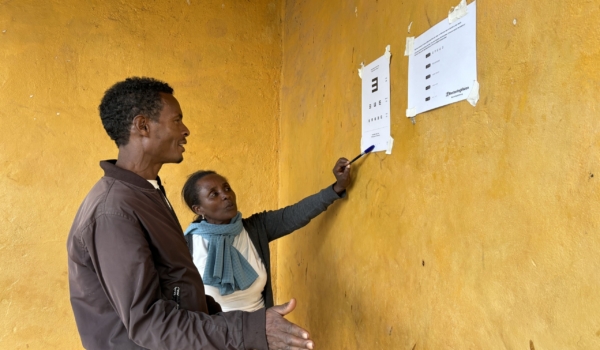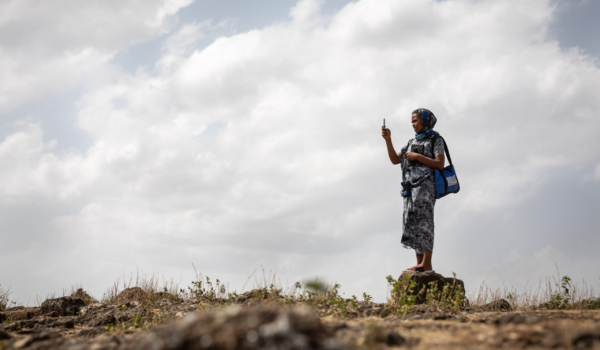Globally, non-communicable diseases are the leading cause of death and disability. This broad category of nontransmissible illness—ranging from cardiovascular diseases to cancer to diabetes—is a threat for those across continents and contexts, but low- and middle-income countries are disproportionately impacted, representing 73% of non-communicable disease deaths.* People in rural and remote communities face even greater risk: their conditions may go undiagnosed for months or years. With health services far away, many people are unaware of their conditions or unable to seek treatment until their symptoms become dire. All too often, this leads to tragic consequences.
Addressing non-communicable diseases means ensuring all people can access screening, early detection, and treatment, as well as education on risk factors and prevention. To close the care gap and reduce preventable deaths from non-communicable diseases amidst a challenging and unpredictable funding landscape, governments and partners need a tested, trusted, and cost-effective solution. Community health workers are that solution—and Ethiopia’s community health workforce is demonstrating what’s possible and creating a blueprint for other countries to follow.
- A nationally scaled, professional community health workforce provides a scaffold for bringing care within reach.
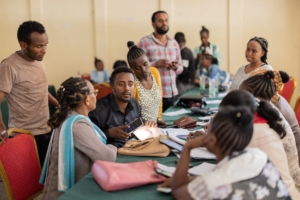
Community health workers attend an in-person session of Ethiopia’s new non-communicable diseases training module.
Health authorities including the World Health Organization identify primary care as optimal for low-cost, high-impact response to non-communicable diseases—and paid, professional community health workers are essential to delivering primary care. Ethiopia’s Health Extension Program is an exemplar: with more than 40,000 community health workers (known nationally as health extension workers) scaled across the country, the program connects rural and remote communities to quality primary care, and has played a key role in improving maternal and child health outcomes.
“We believe the Health Extension Program, with its strong foundation and proven reach, is uniquely positioned to take on the growing challenge of non-communicable diseases,” says Abraham Zerihun Megentta, Country Director for Last Mile Health Ethiopia. “As NCDs rapidly rise across Ethiopia and the continent, scaling community health solutions isn’t just smart—it’s essential to ensuring no one is left behind.”
- Early detection and preventive care is key, and community health workers are ideally positioned to provide it.
Reducing the prevalence and severity of non-communicable disease means ensuring access to screening and early diagnosis. In hard-to-reach areas, this is often all but impossible: people lack access to health facilities where regular check-ups could catch early warning signs, and may be unable to make the journey to care even when symptoms become noticeable. “There are many things patients consider before going to higher health facilities: the distance, the transportation cost, the queue,” explains Zinash Bogale, a community health worker in Ethiopia’s Health Extension Program. “Since most non-communicable diseases do not show signs or symptoms for some time, people tend to be negligent.”
If equipped with the skills to screen for and diagnose non-communicable diseases and their warning signs—such as high blood pressure or high blood glucose levels—community health workers can provide testing as well as treatment or referral within their communities, eliminating the distance to care and offering early intervention. “Having such a service here has a significant meaning for my patients,” says Zinash.
Preventive care, too, is crucial—and community health workers serve as health educators and advocates in their communities. With this proven experience, and holding a place of trust and respect, community health workers are uniquely qualified to promote behaviors that help prevent or manage non-communicable diseases.
3: Strong training, leveraging digital health tools, can equip community health workers to address non-communicable diseases.
Ethiopia’s community health workers deliver an integrated package of primary health services, developing and maintaining their skills through regular training. Following Last Mile Health’s successful pilot in 2021, the Ministry of Health has adopted a blended learning approach for all community health worker training, combining in-person and digital self-learning sessions to strengthen learning gains while reducing costs.
In 2024, Last Mile Health and the Ministry launched a first-of-its-kind blended training in non-communicable diseases, adding a vital new skillset to community health workers’ services. The training equips them to screen for warning signs, refer serious cases to higher health facilities, and manage patient care (from prevention to ongoing treatment). Digital resources support them in keeping their skills sharp.
For community health workers like Zinash, this training represents new hope for patients. One such patient is Tilahun Dudura, who received screenings from Zinash at the Hida Kality Health Post. “I had a check-up, and I was told I was at risk of being hypertensive,” says Tilahun, reporting the leading risk factor for non-communicable disease. “I got counseling services on how to control it. I’m happy to have this service near my home without any financial burden. This health post is like our home.”
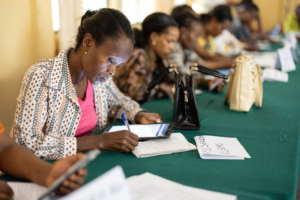
A community health worker refers to digital resources on her tablet during an in-person training session.
- With programs like Ethiopia’s as an example, scaling globally is possible.
Since the pilot training in early 2024, 10,457 community health workers in Ethiopia have completed training in non-communicable diseases. Ultimately, it will reach all 40,000 community health workers in the country. With support from Last Mile Health, the Ministry of Health has begun conducting blended learning trainings independently—an important step toward sustainability and government ownership. The cost-effectiveness of blended training (which reduces costs by nearly 40% compared to traditional in-person learning) is an additional factor in the feasibility of national scaling and a noteworthy consideration for countries seeking to replicate Ethiopia’s success.
With Ethiopia’s Health Extension Program and blended learning training as a blueprint, the outlook on non-communicable diseases is changing—for governments and partners working to scale similar approaches, and for health workers and patients at the last mile. “I think we can bring about change,” says Zinash. “Our communities need these services, as many are suffering. If we have the training and equipment, we can do it!”
* https://www.who.int/news-room/fact-sheets/detail/noncommunicable-diseases

